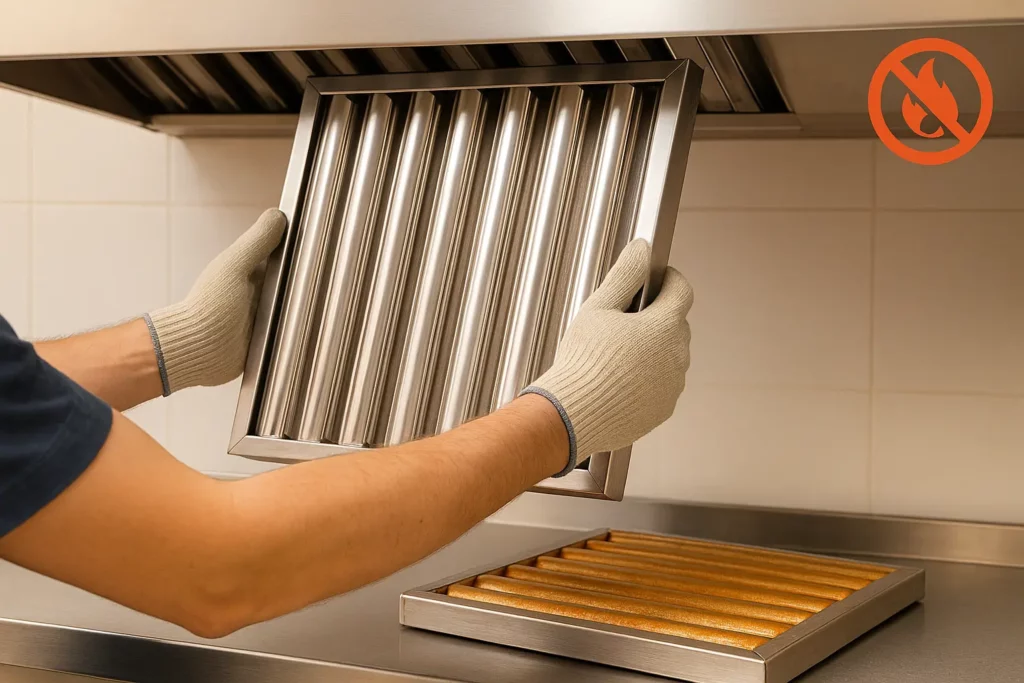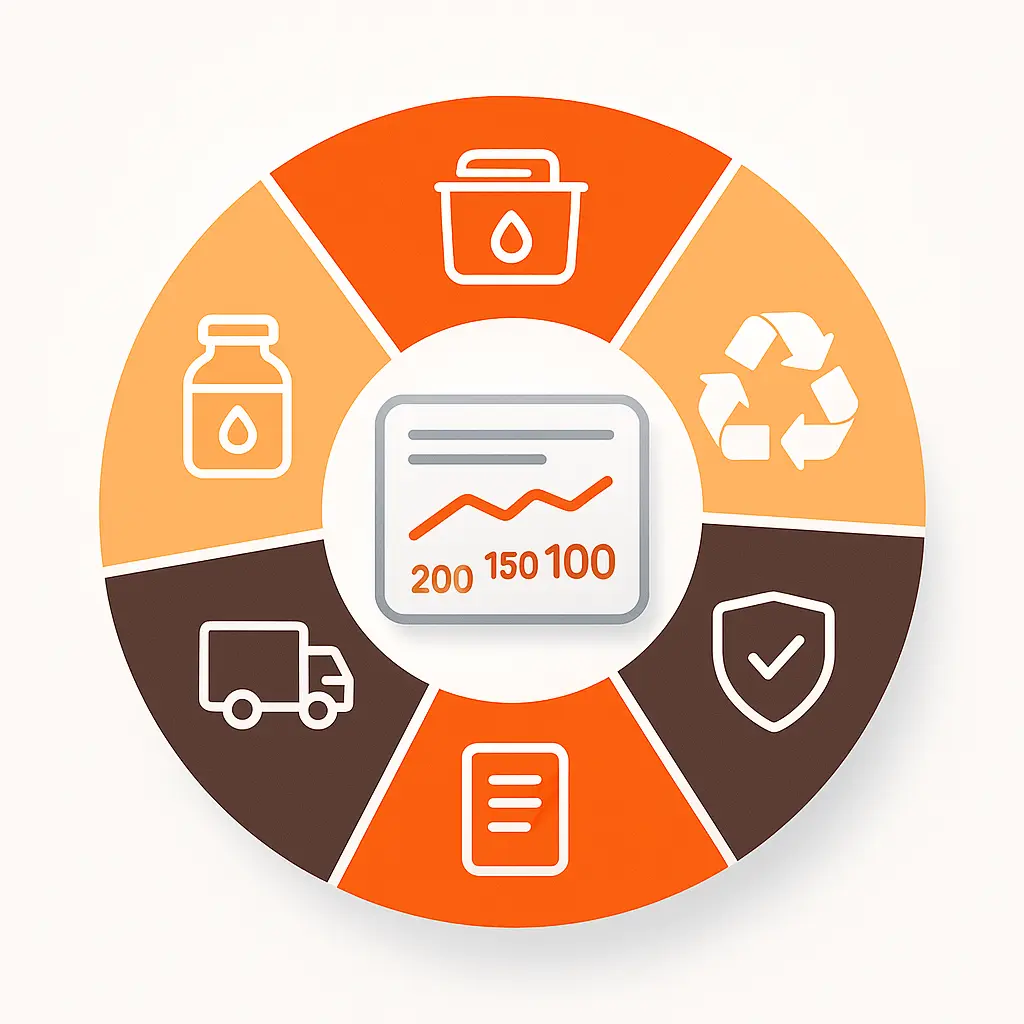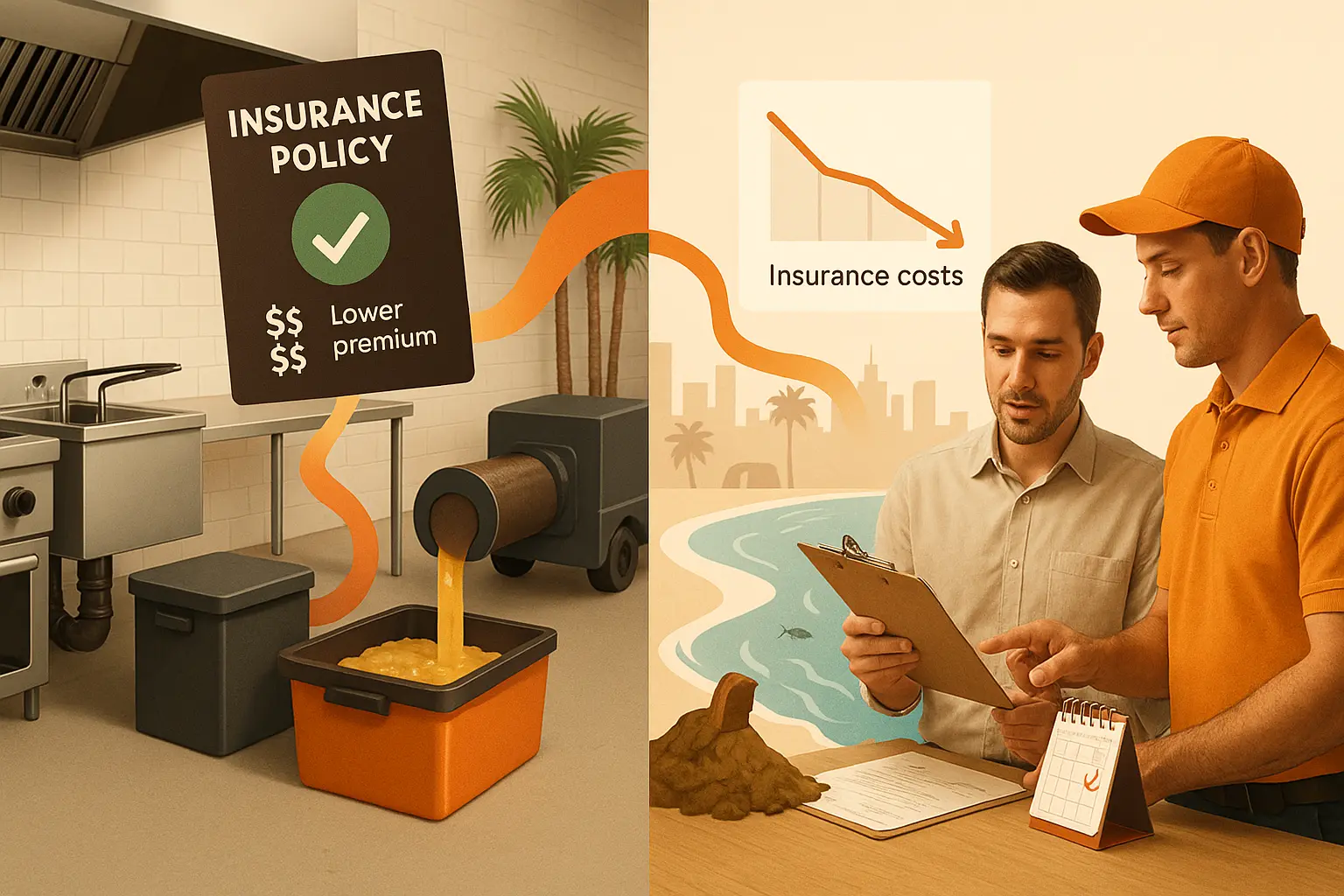Food‑service runs on rhythm; breakfast prep, the lunch rush, the dinner wind down. Smooth business operations depend on clean lines and steady kitchen operations. A dependable used cooking oil (UCO) program keeps that rhythm steady, turning leftover cooking oil into a renewable resource while boosting collection efficiency.
Used Cooking Oil Collection & Insurance
Drivers arrive on time, pick up every gallon, and offer containers sized for both small cafés and sprawling hotel kitchens, so used cooking oil recycling services work for any project. Timely collection keeps tanks clear and prevents clogs in the sanitary sewer lines while the oil is turned into biodiesel. When pickups run smoothly, cooks stay focused, guests see calm service, and the business meets every rule in the book. At renewal, that discipline shows up as lower premiums, smaller deductibles, and, often, cash‑back dividends—clear benefits any commercial kitchen can appreciate.
Why insurers watch grease so closely
Grease fires, blocked pipes, and failed health inspections drive claim costs through the roof—issues that put every operation at unnecessary risk. Insurers reward kitchens that nail two habits:
- Perform scheduled grease trap cleaning every one to three months. A clean grease trap stops fats, oils, and grease (FOG) from entering city lines. Regular service keeps wastewater flowing, prevents emergency plumbing, and proves equipment is in optimal condition. Most traps need cleaning on a schedule matched to their size and FOG load—skip the cycle and costly repair bills follow. The grease trap cleaning process includes pumping out contents, washing the inside with detergent, and rinsing with hot water.
- Recycle every gallon through a licensed hauler. Timely pickups keep tanks clear and turn UCO into biodiesel instead of pollution, helping commercial kitchens benefit from easier regulatory compliance and fewer grease‑driven blockages.
With those habits in place, floor drains stay dry, pipes stay clear, and carriers cut rates for the low‑risk account.
Filter Maintenance and Fire Safety

Regular filter‑exchange services help improve kitchen air quality by capturing grease particles. Hood filters swapped on schedule capture grease particles, preventing them from entering exhaust ductwork, improve air quality, and maintain steady airflow—an efficient solution that lets the whole team work in comfort and keeps the line operational.
Properly maintained filters help prevent flash fires, and professional filter exchange prevents fire hazards in commercial kitchens, and regular maintenance of commercial kitchen filters is essential for compliance with local health codes.
Neglected filters reduce airflow, create hot, uncomfortable working conditions, and raise fire risk—issues local health and fire departments flag during compliance inspections.
Regular filter‑exchange services provide documentation of maintenance compliance, supplying a clear replacement record, and helping operators respond immediately to any inspector’s question. Restaurants that do not maintain their fire‑prevention systems risk heavy fines or closure.
A tight calendar of trap service, filter exchange, and oil pickups proves regulatory compliance with state environmental regulations, keeps pollutants out of waterways, and protects city infrastructure from backups.
Understanding grease waste
Grease waste is more than housekeeping; ignoring it invites non‑compliance penalties and shifts basic responsibility onto emergency crews. Let it build up and it clogs pipes, pollutes rivers, attracts pests, and drives customers away with bad smells. One overflow can shut a kitchen during peak service and trigger a string of fines. Regular inspections: pump, wash with detergent, rinse with hot water; keep the system in optimal performance and show inspectors the kitchen meets modern safety standards.
Key risks
- Environmental damage to soil and waterways—unwanted fats and oils leach out fast.
- Emergency shutdowns and lost sales that leave employees and guests to worry.
- Pest infestations and lingering odors.
- Fines, cleanup costs, and reputation loss.
Paperwork that lowers premiums
Underwriters need proof, not promises. Keep three simple records:
- Service manifests: gallons collected, driver signature, certified facility ID.
- Trap‑pump logs: date and volume of each cleaning to show the system stays efficient.
- Training sheets: staff know spill response and FOG limits.
Together, these documents form a clear trail that speeds every renewal and protect your bottom line.
Carrier programs that pay for good habits
| Carrier | Perk |
|---|---|
| Nationwide FoodSafe | 5 % credit with quarterly manifests |
| Hartford Hospitality Advantage | $1 000 deductible drop after one clean year |
| Traveler’s KitchenGuard | Dividend check when claims stay at zero |
| Florida Peninsula Commercial | Rate discount if manifests arrive within 48 h |
| Broward Mutual | Waives sewer‑backup exclusion once recycling is documented |
Certified Technician Assurance
Certified technicians handle filter installs, apply security seals, document chain‑of‑custody separate from oil manifests, and are trained in fire‑safety requirements and proper installation of filters. Their visit keeps exhaust ducts clear, the air clean, and the insurer happy.
Best practices that unlock every credit

Step by Step Action Plan
- Schedule trap cleanings every 60 days, no exceptions and assign a point person to respond if a spill happens between visits.
- Scan manifests to cloud storage before the truck pulls away.
- Label tanks USED COOKING OIL—FOOD GRADE to avoid mix‑ups on the loading ground and keep transportation clear.
- Review paperwork a month before renewal so the broker can negotiate.
- Drill spill response quarterly—accidents require a prepared plan and fast cleanup to protect staff and guests.
- Swap hood filters weekly in high‑volume kitchens; fresh filters keep airflow steady, staff comfortable, and odors at bay.
These habits prove the kitchen meets fire‑safety regulations and holds to the high bar set by health inspectors.
The rulebook and the real‑world penalty
Florida’s Administrative Code is strict: miss a pump‑out and inspectors notice. Pass a DEP audit and insurance perks follow; fail and surcharges land mid‑term. Emergency cleanup crews can help, but their invoice dwarfs routine service costs—a reminder that prevention is essential.
Dollars and sense
A pizza shop with $3,000 in annual property coverage saves about $210 by submitting clean paperwork. Throw in the sewer‑backup waiver worth $150 and the savings almost cover a year of hauling.
Moving forward
- Contact your broker to see which carriers reward grease recycling.
- Hire a licensed hauler that emails manifests immediately the same day.
- Set calendar alerts for pump‑outs, uploads, and quarterly reviews.
- Renew with confidence—twelve months of spotless records speak for themselves and protect your bottom line.
Final word
Grease recycling and filter care are not busywork; they protect pipes, prevent sewer clogs, keep staff safe, and free up cash each year. When traps are clean, filters fresh, paperwork tight, pickups prompt, and transportation efficient, the insurer sees a low‑risk partner—and a low‑risk partner always pays less.
*This article covers topics that can affect a company’s financial liability and operational safety. It is provided for informational purposes only and does not constitute legal, environmental, or insurance advice. Always consult qualified professionals and local regulators before making compliance or safety decisions.









